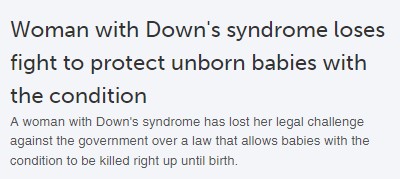Woman with Down's syndrome loses fight to protect unborn babies with the condition
A woman with Down's syndrome has lost her legal challenge against the government over a law that allows babies with the condition to be killed right up until the moment of birth.
Heidi Crowter, 26, from Coventry, had brought the case against the Department of Health and Social Care to the High Court, saying the law did not respect her life.
She was one of three claimants who brought the legal action, in the hope of removing a section of the Abortion Act.
In England, Wales and Scotland, any baby is allowed to be killed within the first 24 weeks of pregnancy.
But a baby can be killed up until birth if there is a so-called "risk" that the child is born with a physical or mental "abnormality" and might be handicapped, including Down’s syndrome.
At a two-day High Court hearing in July, lawyers representing the Down's syndrome campaigners argued the law is unlawfully discriminatory and incompatible with the European Convention on Human Rights.
But in a ruling handed down on Thursday morning, the Judges rejected the legal challenge.
Speaking outside court at the time of the hearing, Ms Crowter said: "I am someone who has Down’s syndrome and I find it extremely offensive that a law doesn’t respect my life, and I won’t stand for it.
"I want to change the law and I want to challenge people’s perception of Down’s syndrome. I want them to look at me and say 'this is just a normal person'.
"That’s what this is about. It’s about telling people that we’re just humans with feelings.”
Maire Lea-Wilson, 33, an accountant and mother-of-two from west London, whose son Aidan has Down’s syndrome, is also bringing the case.
She said: "I was 34 weeks pregnant when I discovered Aidan had Down’s syndrome, and I was asked if I wanted to terminate the pregnancy, in the context of a lot of medically biased information, and my own grief, three times.
"The last time I was asked to terminate the pregnancy was two days before he was born.”
Representing the claimants, barrister Jason Coppel said they were diagnosed with Down’s syndrome while still in the womb, but were not aborted, "…and they live happy and fulfilling lives, as evidence shows the majority of people with Down’s syndrome do."


